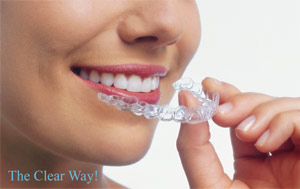Blog
How Much Pain Can I Expect With Invisalign?
Conventional metal braces get a bad reputation. They are highly effective at straightening teeth, great for those that have severe malocclusion, and can be designed to be less visible so you feel slightly less self-conscious.
But the look of braces isn’t the only reason they are not popular. Many people prefer to avoid metal braces because metal braces are associated with pain.
How Do Metal Braces Cause Pain?
Every 6 weeks, patients with metal braces have to get their braces adjusted. This adjustment can cause the entire mouth to feel a painful tightness that can make it harder to eat.
In addition, metal braces can scratch and cut the inner lips and inner cheeks. This is especially common after an adjustment, but can also occur any time you smile, laugh, talk, chew, or accidentally put pressure on your face.
Overall, conventional metal braces are known for causing pain in a variety of different ways, and many patients prefer to avoid braces because they’ve heard about that pain from others.
How Painful is Invisalign?
For those that want to avoid the look of metal braces, the best possible treatment is Invisalign. The clear aligners are practically invisible to the naked eye, and make it easy for you to smile and go about your day without being self-conscious.
Anyone looking for a clear aligner to hide their braces is going to prefer Invisalign. But what about those hoping to avoid pain?
That is a bit more complex:
- Some of the pain from braces is simply your teeth being pushed into the proper placement. Some pressure and pain is unavoidable, especially when switching to a new aligner.
- However, Invisalign is less likely to cause any pain to the inside of your cheeks and lips, because there is nothing on the aligner that can scratch them.
With Invisalign, future tooth discomfort over time may also be reduced, because your teeth are less likely to be decayed and damaged.
Overall Thoughts on Invisalign and Pain
If you’re hoping to avoid all pain and discomfort with Invisalign, your chances are slim. Although some patients are pain free, others experience at least mild discomfort, and in uncommon causes more moderate discomfort. But compared to traditional metal braces, the discomfort felt with Invisalign is more likely to be manageable, and less likely to involve cuts and sores inside the mouth.
Overall, Invisalign should, in most cases, cause less pain than traditional metal braces.

